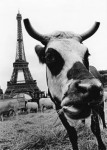 The intricate interrelationship between urban context and food production, central to the current debate on sustainability, will be the focus of the 2012 Garden and Landscape Studies symposium at Dumbarton Oaks. It will explore the links between culture and cultivation, with particular respect to the modern era and urbanization schemes that engaged the production of food, either as a means to achieve self-sufficiency, or as part of a ruralist perspective. As the city displaced food production further from its center, the relationship between living, working, and eating became more abstract. Today, this relationship is tested across planning and community design schemes: American suburban developments include agricultural land as a conservation measure and a nostalgic nod to a pre-agribusiness countryside; European designers focus on the suburban-rural interface to develop a new type of productive landscape, one performing simultaneously as an open space system and an agricultural laboratory; and in cities like Kampala, Uganda, or Rosario, Argentina, urban agriculture is part of a participatory design process that integrates housing programs.
The intricate interrelationship between urban context and food production, central to the current debate on sustainability, will be the focus of the 2012 Garden and Landscape Studies symposium at Dumbarton Oaks. It will explore the links between culture and cultivation, with particular respect to the modern era and urbanization schemes that engaged the production of food, either as a means to achieve self-sufficiency, or as part of a ruralist perspective. As the city displaced food production further from its center, the relationship between living, working, and eating became more abstract. Today, this relationship is tested across planning and community design schemes: American suburban developments include agricultural land as a conservation measure and a nostalgic nod to a pre-agribusiness countryside; European designers focus on the suburban-rural interface to develop a new type of productive landscape, one performing simultaneously as an open space system and an agricultural laboratory; and in cities like Kampala, Uganda, or Rosario, Argentina, urban agriculture is part of a participatory design process that integrates housing programs.
Organized by Dorothée Imbert, this symposium will provide a critical historical framework for today’s urban agriculture by discussing the multiple scales, ideologies, and contexts of productive landscapes, from allotment gardens to regional plans. Speakers will address the production and distribution of food in relation to human settlement and urban form, from German Siedlungen to Italian Fascist new towns, and Israeli kibbutzim to contemporary Tokyo. The particular focus will be on the efforts of modern and early-modern landscape architects, garden designers, and architects/planners to reconcile the demands of feeding cities and regions with the exigencies of urban expansion.
Confirmed speakers and topics include
- Florent Quellier on the production and distribution of fruit and vegetables in seventeenth- and eighteenth-century Paris and environs;
- Susan Leduc on the relation between Paris and its periphery before and after nineteenth-century annexation and the shift from culture maraîchère to a landscape of leisure;
- Meredith Tenhoor on the connection between agricultural and urban spaces in mid-twentieth-century France through National Wholesale Markets such as Rungis;
- Mary McLeod on Le Corbusier’s Radiant Farm and agricultural and planning ideals;
- David Haney on Peter Kropotkin, Leberecht Migge, and agricultural self-sufficiency in early twentieth-century Russia and Germany;
- David Rifkind on Fascist new towns in Italy and Ethiopia;
- Zef Hemel on the history of theIJsselmeerpolders as a productive landscape in relation to modernist plans for extending Amsterdam;
- Jordan Sand on the Tokyo Bay as a productive landscape;
- Donna Graves on Japanese immigrant farmers in metropolitan California;
- Tal Alon-Mozes on kibbutzim/moshavim and the creation of a national identity through agriculture in Israel;
- Margaret Crawford on lineal villages in China’s Pearl River Delta;
- Laura Lawson on the history of community gardens in the United States; and
- Luc Mougeot on urban agriculture in the global south
The symposium will be held from 8:45 am to 6:00 pm, May 4th and May 5th. A detailed schedule and further details shall be posted in April.
Visit site: http://www.doaks.org/research/garden_landscape/doaks_gal_symposium_2012_05_04-05.html




